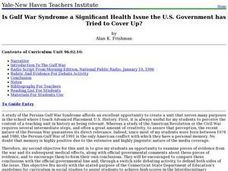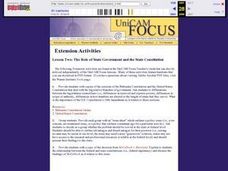Center for Civic Education
What Basic Ideas About Government Are Included in the Preamble to the Constitution?
Young historians explore the meaning of the Preamble to the US Constitution in this upper-elementary social studies lesson. Working with partners or in small groups, children discuss the purpose of government before reading and analyzing...
National Endowment for the Humanities
James Madison: Madison Was There
Madison was there! Scholars go on a journey to discover the person behind the founding father label as they explore James Madison's role in the formation of the United States government. The culmination is a writing assignment and...
Heritage Foundation
The House of Representatives
The House of Representatives has a lot of responsibility in the United States government. But how did it all begin, and why is it the way it is now? A comprehensive lesson answers all of these questions about the US Constitution and...
West Virginia Department of Education
A State of Convenience: The Creation of West Virginia
Ever wondered why there is a West Virginia but not an East Virginia? The resource answers questions like this one and more as it takes an in-depth and detailed look at the history of West Virginia and how it became a state. Several...
C-SPAN
Middle School Checks and Balances
Seven video clips reveal how the checks and balances built into the constitutional framework of the United states' government are designed to keep any one branch from becoming too powerful. After watching each clip, groups identify the...
Curated OER
Four Famous Faces
Each one of our quarters is embellished with a famous face or image representing the state it came from. This lesson uses South Dakota's state quarter to get kids thinking about monetary value, what the president of the United States...
National Endowment for the Humanities
Lost Hero: Was John Hanson Actually the First President?
The first president of the United States was ... John Hanson? Scholars investigate the notion that the initial leader of the nation was not George Washington. Using research, articles, and open discussion, individuals create a quest for...
Constitutional Rights Foundation
270 Votes to Win: The Electoral College in the United States
What exactly is the Electoral College and how does it work? The lesson is part of a larger series on government that explains what the Electoral College is and how it helps determine an election winner. Academics participate in...
iCivics
Municipal Government: High School
Municipal government takes on many roles, not just the ones we are used to hearing about such as Parks and Recreation. Scholars delve into the topic to get a grasp on how the government system functions. They participate in readings,...
Curated OER
The Supreme Court: The Judicial Power of the United States
Students investigate some basic facts about the Supreme Court by examining the United States Constitution and one of the landmark cases decided by that court. The operation of the Supreme Court forms the focus of the lesson.
K20 LEARN
Government Power: Do the Actions of Government Effect Me?
What does the government have to do with getting a driver's license? Including the calorie count for a meal on a restaurant menu? By discussing these kinds of questions and researching how concepts behind federal, state, and local...
Curated OER
Central American Immigrants to the United States: Refugees from Unrest
Students identify the major aspects of Olmec and Mayan civilzations, including economic, political, and religious. They list contributions of these civilizations. Students identify the Central American countries where the United States...
Roy Rosenzweig Center for History and New Media
Immigration: Why Come to the United States?
Don't limit your curriculum to texts! Young historians listen to a song, read an interview, and examine a cartoon as they explore motivations for immigrating to the US in the late 19th and early 20th centuries.
Curated OER
US Constitution and Connecticut
High schoolers analyze copies of primary source documents and list similarities between the Fundamental Orders of Connecticut and the United States Constitution following a review of culture and government of the 17th century.
Curated OER
Citizens of the Future
Young sociologists explore how local, state, and federal governments work. This very impressive and ambitious lesson plan requires pupils to contact government officials who represent them and their families. They research elections, and...
Oakwood Publishing
Workshop 4: Constitutional Convention
How do new amendments become part of the US Constitution? AP government students explore, analyze, and use the US Constitution to develop a deep understanding of the interworkings of law and government while practicing synthesis and...
Curated OER
Is Gulf War Syndrome a Significant Health Issue the U.S. Government has Tried to Cover Up?
High schoolers examine the issues surrounding Gulf War Syndrome. In groups, they analyze evidence from the war and medical information. They participate in a debate in which they support their feelings on whether the government of the...
Curated OER
The Role of State Government and the State Constitution
Students examine sections of the Nebraska Constitution and the U.S. Constitution, and compare/contrast the two. They research policy issues, and decide whether they should be solved at the state or federal level.
National Endowment for the Humanities
Lesson 4 James Madison: Internal Improvements Balancing Act—Federal/State and Executive/Legislative
Who has the power? The founding fathers asked the same question when the United States was formed. Learners explore issues that arose during Madison’s presidency that raised constitutional questions. Through discovery, discussion, and...
National Endowment for the Humanities
James Madison: Raising an Army—Balancing the States and the Federal Government
To war! To war! Every nation in the history of the world has had to deal with warfare on some level. Scholars go through a series of activities and discussions surrounding the development of the Constitution to help them better...
PBS
Evolution of the Presidency: Theodore Roosevelt to Franklin D. Roosevelt
How much power should a president be allowed to exert? Theodore Roosevelt and Franklin D. Roosevelt exercised their power according to their interpretations of the United States Constitution, and these interpretations affected the...
Curated OER
What is the Federal System Created by the Constitution?
Explore the unique structure of the federal system of government in the United States. Class members will learn about how most nations were organized before the establishment of the Constitution, how power is currently divided between...
Curated OER
The Great State!
The creation of state home pages is the focus of this lesson. Learners research one of15 states for which special State Quarters have been released, and create a home page for that state. They also perform Internet research and utilize...
Smithsonian Institution
Native Resistance: Native Resistance Then and Now
Native Americans lost so much—and gained so little in return. Scholars explore Native Americans' resistance to the United States government. The lesson uses primary sources to explore the different forms of protest and gives a voice to...

























